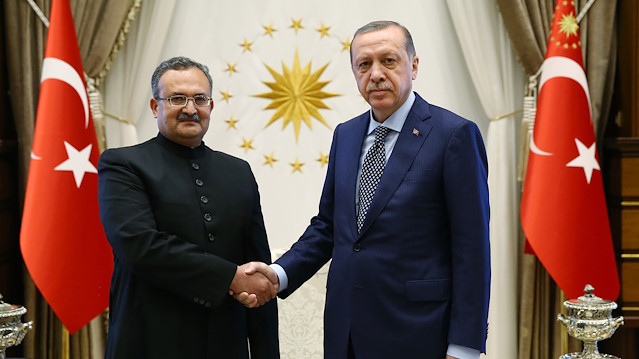
In wake of Kashmir dispute's 71st anniversary, Syrus Sajjad Qazi calls on UN Security Council to resolve issue
Pakistan’s ambassador to Ankara on Friday called on the UN Security Council to help resolve the conflict in Kashmir.
In an interview with Anadolu Agency given in the wake of the 71st anniversary of the Kashmir dispute, Muhammad Syrus Sajjad Qazi called for an "independent and transparent" inquiry under the UN auspices to hold the perpetrators of the acts accountable.
On Oct. 27, 1947, Indian troops positioned themselves in Kashmir’s largest city Srinagar after India and Pakistan gained their independence at the end of the British colonial rule. The 71st anniversary of this Indian action is observed by Pakistanis and Kashmiris as a “Black Day”, while India commemorates it as “Accession Day.”
Qazi said: "As a result of the Indian occupation, not only the entire region has been facing threats to peace and security for the past seven decades, but the Kashmiris under occupation have endured the worst atrocities and human rights abuses.”
Kashmir, a Muslim-majority Himalayan region, is held by India and Pakistan in parts and claimed by both in full. The two countries have fought three wars -- in 1948, 1965 and 1971 -- since they were partitioned in 1947.
Since 1989, Kashmiri resistance groups have been fighting in Indian-held Kashmir against Indian rule for independence, or for unification with neighboring Pakistan.
Qazi said an estimated 95,000 Kashmiris have been martyred and thousands of women have been raped and molested since 1989.
"For the Kashmiris, this day not only symbolizes the start of an era of occupation, repression, and grave and systemic human rights abuses by Indian occupation forces, but also marks the start of Kashmiri people’s resistance and defiance against this illegal occupation," Qazi said.
He noted that India took the dispute to the UN Security Council, but the country has refused to implement the Security Council resolutions.
"The continued suffering of the Kashmiris under the Indian occupation is also a sad reflection on the inability of the international community, in particular the United Nations Security Council to implement its moral and legal responsibilities," Qazi said.
The ambassador also said despite calls by the international human rights organizations, including the Office of the High Commissioner for Human Rights (OHCHR), India continues to deny access to all human rights monitors and media to the occupied territory.
"Our position on the settlement of Jammu and Kashmir dispute is consistent with the UN Security Council Resolutions. Sadly, India continues to shy away from this reality, and is instead dragging the entire region down the precipice of conflict.
He added Pakistan wishes to resolve all disputes with India through a "serious and comprehensive" dialogue that covers all issues of concern.
Qazi said India frequently violates the ceasefire along the Line of Control [a military boundary splitting the disputed Kashmir region between India and Pakistan] in Kashmir, adding: "It is also threatening to wage a 'limited war' against Pakistan."
"This belligerent and irresponsible attitude will only push the region further down the precipice of conflict and instability," he said.
The ambassador added there can be no lasting peace in South Asia without a just settlement of the Kashmir dispute based on the UN Security Council resolutions and the will of the Kashmiri people.
"International community, in particular the United Nations Security Council, has an important role to play in the just resolution of this dispute," he said.
Qazi added the UN as well as the Organization of Islamic Cooperation (OIC) have an important role to play in ending the "gross and systematic" violations of human rights being perpetrated by the Indian forces.



